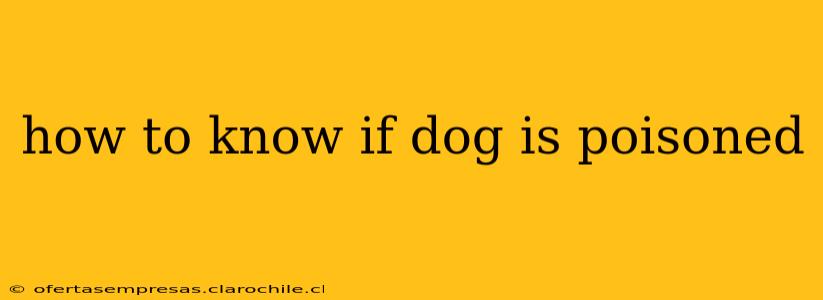How to Know if Your Dog is Poisoned: Recognizing the Signs and Taking Action
Discovering your dog has ingested poison is a terrifying experience. Quick recognition of the symptoms and immediate action are crucial for your dog's survival. This guide will help you understand the signs of poisoning in dogs, what to do if you suspect poisoning, and how to prevent future incidents.
Understanding the Variety of Poisons
Many household items and substances can be toxic to dogs, even in small amounts. These include medications (both human and veterinary), cleaning products, antifreeze, chocolate, grapes, raisins, certain plants (like lilies and azaleas), insecticides, rat poison, and fertilizers. The severity of the poisoning depends on the type and amount of toxin ingested, as well as your dog's size and overall health.
Common Symptoms of Dog Poisoning
Recognizing the signs of poisoning is the first step to saving your dog's life. Symptoms can vary widely depending on the toxin, but some common indicators include:
- Gastrointestinal Issues: Vomiting (possibly bloody), diarrhea (possibly bloody), loss of appetite, excessive drooling, abdominal pain.
- Neurological Symptoms: Tremors, seizures, weakness, incoordination, difficulty breathing, dilated pupils, collapse.
- Cardiovascular Problems: Rapid or slow heart rate, abnormal heart rhythm.
- Respiratory Distress: Difficulty breathing, panting, gasping.
- Skin Irritation: Redness, itching, swelling, blistering.
- Behavioral Changes: Lethargy, unusual aggression, excessive thirst or urination.
It's crucial to remember that not all dogs will show all symptoms, and some symptoms may be subtle. Even if you suspect only mild symptoms, it's vital to seek veterinary attention immediately.
What to Do if You Suspect Your Dog is Poisoned
Time is of the essence. Immediate action can significantly improve your dog's chances of survival. Here's what you should do:
- Identify the Poison (if possible): Try to determine what your dog ingested. Note the name of the product, the amount ingested, and when it happened. This information is vital for your veterinarian.
- Contact Your Veterinarian or an Animal Poison Control Center Immediately: Don't wait for symptoms to worsen. Your vet can provide guidance and potentially life-saving treatment. The ASPCA Animal Poison Control Center (APCC) is a valuable resource; their phone number is (888) 426-4435 (a consultation fee may apply).
- Do NOT induce vomiting unless specifically instructed by your veterinarian or the APCC. Inducing vomiting can sometimes worsen the situation, especially with certain toxins.
- Keep your dog calm and comfortable: Minimize stress and movement.
- Gather Information: Take any packaging or labels from the suspected poison with you to the vet.
- Transport your dog to the veterinary clinic safely and immediately: Depending on the severity of the situation, the vet may advise you to bring your dog in immediately or to follow specific instructions for transport.
How Can I Prevent My Dog From Getting Poisoned?
Prevention is key! Follow these steps to minimize the risk of poisoning:
- Secure hazardous materials: Keep all cleaning products, medications, insecticides, and other potentially toxic substances securely stored, out of your dog's reach. Use childproof locks if necessary.
- Supervise your dog closely, especially when outdoors: Prevent your dog from scavenging or eating anything they find on the ground.
- Be aware of poisonous plants: Familiarize yourself with common poisonous plants in your area and keep your dog away from them.
- Use pet-safe products: Choose cleaning products, pest control methods, and fertilizers specifically labeled as safe for pets.
- Educate family members and visitors: Make sure everyone in your household understands the potential dangers of certain substances and how to keep them out of reach of your dog.
What if my dog ate chocolate?
Chocolate toxicity in dogs depends on the type of chocolate (dark chocolate is the most dangerous) and the amount ingested. Theobromine, a compound found in chocolate, is toxic to dogs. Even a small amount of dark chocolate can be harmful to small dogs. Contact your vet or the APCC immediately if you suspect your dog has eaten chocolate.
What if my dog ate rat poison?
Rat poison can be extremely dangerous and potentially fatal to dogs. If you suspect your dog has ingested rat poison, seek immediate veterinary attention. The type of rat poison and the amount ingested will determine the treatment.
By understanding the symptoms, taking immediate action, and implementing preventative measures, you can significantly reduce the risk of poisoning and increase your dog's chances of survival. Remember, when in doubt, always err on the side of caution and seek professional veterinary help immediately.
